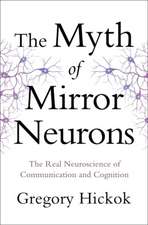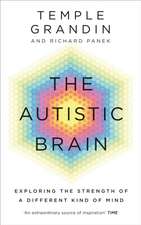Animal Models of Dementia: Neuromethods, cartea 48
Editat de Peter Paul De Deyn, Debby Van Damen Limba Engleză Hardback – dec 2010
| Toate formatele și edițiile | Preț | Express |
|---|---|---|
| Paperback (1) | 727.77 lei 6-8 săpt. | |
| Humana Press Inc. – 23 aug 2016 | 727.77 lei 6-8 săpt. | |
| Hardback (1) | 981.58 lei 6-8 săpt. | |
| Humana Press Inc. – dec 2010 | 981.58 lei 6-8 săpt. |
Din seria Neuromethods
- 5%
 Preț: 347.57 lei
Preț: 347.57 lei - 15%
 Preț: 659.53 lei
Preț: 659.53 lei - 15%
 Preț: 665.08 lei
Preț: 665.08 lei - 18%
 Preț: 986.63 lei
Preț: 986.63 lei - 24%
 Preț: 852.89 lei
Preț: 852.89 lei - 18%
 Preț: 953.03 lei
Preț: 953.03 lei - 18%
 Preț: 955.25 lei
Preț: 955.25 lei - 20%
 Preț: 1129.36 lei
Preț: 1129.36 lei - 20%
 Preț: 1252.04 lei
Preț: 1252.04 lei - 18%
 Preț: 1291.45 lei
Preț: 1291.45 lei - 15%
 Preț: 652.31 lei
Preț: 652.31 lei - 18%
 Preț: 955.70 lei
Preț: 955.70 lei - 23%
 Preț: 705.39 lei
Preț: 705.39 lei - 18%
 Preț: 973.38 lei
Preț: 973.38 lei - 18%
 Preț: 964.86 lei
Preț: 964.86 lei - 18%
 Preț: 968.03 lei
Preț: 968.03 lei - 15%
 Preț: 662.95 lei
Preț: 662.95 lei - 15%
 Preț: 646.43 lei
Preț: 646.43 lei - 15%
 Preț: 649.71 lei
Preț: 649.71 lei -
 Preț: 395.29 lei
Preț: 395.29 lei - 19%
 Preț: 580.67 lei
Preț: 580.67 lei - 19%
 Preț: 584.12 lei
Preț: 584.12 lei - 19%
 Preț: 566.41 lei
Preț: 566.41 lei - 15%
 Preț: 652.17 lei
Preț: 652.17 lei - 15%
 Preț: 655.13 lei
Preț: 655.13 lei - 18%
 Preț: 959.36 lei
Preț: 959.36 lei - 15%
 Preț: 652.49 lei
Preț: 652.49 lei - 15%
 Preț: 649.54 lei
Preț: 649.54 lei - 15%
 Preț: 649.87 lei
Preț: 649.87 lei - 15%
 Preț: 650.19 lei
Preț: 650.19 lei - 15%
 Preț: 648.42 lei
Preț: 648.42 lei - 18%
 Preț: 1039.22 lei
Preț: 1039.22 lei - 18%
 Preț: 963.15 lei
Preț: 963.15 lei
Preț: 981.58 lei
Preț vechi: 1197.05 lei
-18% Nou
Puncte Express: 1472
Preț estimativ în valută:
187.83€ • 196.51$ • 156.03£
187.83€ • 196.51$ • 156.03£
Carte tipărită la comandă
Livrare economică 03-17 aprilie
Preluare comenzi: 021 569.72.76
Specificații
ISBN-13: 9781607618973
ISBN-10: 1607618974
Pagini: 732
Ilustrații: XV, 732 p.
Dimensiuni: 178 x 254 x 47 mm
Greutate: 1.48 kg
Ediția:2011
Editura: Humana Press Inc.
Colecția Humana
Seria Neuromethods
Locul publicării:Totowa, NJ, United States
ISBN-10: 1607618974
Pagini: 732
Ilustrații: XV, 732 p.
Dimensiuni: 178 x 254 x 47 mm
Greutate: 1.48 kg
Ediția:2011
Editura: Humana Press Inc.
Colecția Humana
Seria Neuromethods
Locul publicării:Totowa, NJ, United States
Public țintă
ResearchCuprins
General Introduction to Animal Models of Human Conditions.- Animal Models of Dementia: Ethical Considerations.- The Role of Rodent Models in the Drug Discovery Pipeline for Dementia.- Species, Strain, and Gender Issues in the Development and Validation of Animal Models of Dementia.- Transgenic and Gene Targeted Models of Dementia.- Transgenic Animals and Intellectual Property Concerns.- Pathological Validation of Animal Models of Dementia.- Behavioral Validation in Animal Models of Dementia.- Pharmacological Validation in Animal Models of Dementia.- Validation of Animal Models of Dementia: Neurochemical Aspects.- Validation of Dementia Models Employing Neuroimaging Techniques.- Drosophila melanogaster as a Model Organism for Dementia.- Caenorhabditis elegans as a Model Organism for Dementia.- Zebrafish (Danio rerio) as a Model Organism for Dementia.- Spontaneous Vertebrate Models of Alzheimer Dementia: Selectively Bred Strains (SAM Strains).- Lesion-Induced Vertebrate Models of Alzheimer Dementia.- Aβ Infusion and Related Models of Alzheimer Dementia.- APP-Based Transgenic Models: The PDAPP Model.- APP-Based Transgenic Models: The Tg2576 Model.- APP-Based Transgenic Models: The APP23 Model.- Presenilin-Based Transgenic Models of Alzheimer’s Dementia.- APOE-Based Models of “Pre-Dementia”.- TAU Models.- The 3xTg-AD Mouse Model: Reproducing and Modulating Plaque and Tangle Pathology.- Cognitive Dysfunction in Genetic Mouse Models of Parkinsonism.- Mouse Models of Metachromatic Leukodystrophy and Adrenoleukodystrophy.- Animal Models of Amyotrophic Lateral Sclerosis.- Animal Models of Frontotemporal Dementia.- CADASIL: Molecular Mechanisms and Animal Models.- Spontaneously Hypertensive Rat (SHR): An Animal Model of Vascular Brain Disorder.- Animals Models of Normal Pressure Hydrocephalus.- Animal Models of Traumatically-Induced Dementia.- Animal Models of Alcohol-Induced Dementia.- Animal Models of Metallic Dementia.
Recenzii
From the book reviews:
“A complete guide to lesion induced, genetic knockout, and phylogenetic approaches to dementias is catalogued. … I recommend this book for animal researcher for sure, and neurologists in particular.” (Joseph J. Grenier, Amazon.com, August, 2014)
“A great add-on to more basic textbooks on mechanisms of dementia. The book not only nicely summarizes ongoing efforts to model dementia but also describes how to investigate underlying mechanisms at various level of complexity. … Importantly, leading mouse models are discussed, which is very useful for newcomers to the field, as there are a lot of different models. … Additionally, the book provides information about ethics on animal experimentation and information on intellectual property, issues that can be rarely found in textbooks.” (Karl Peter Giese, British Journal of Clinical Pharmacology, May, 2011)
“A complete guide to lesion induced, genetic knockout, and phylogenetic approaches to dementias is catalogued. … I recommend this book for animal researcher for sure, and neurologists in particular.” (Joseph J. Grenier, Amazon.com, August, 2014)
“A great add-on to more basic textbooks on mechanisms of dementia. The book not only nicely summarizes ongoing efforts to model dementia but also describes how to investigate underlying mechanisms at various level of complexity. … Importantly, leading mouse models are discussed, which is very useful for newcomers to the field, as there are a lot of different models. … Additionally, the book provides information about ethics on animal experimentation and information on intellectual property, issues that can be rarely found in textbooks.” (Karl Peter Giese, British Journal of Clinical Pharmacology, May, 2011)
Textul de pe ultima copertă
With an ever-increasing elderly population and the resultant rising levels of dementia-related disorders, preclinical research based on animal models is pivotal to our knowledge of underlying molecular mechanisms and drug discovery aiming at the development of therapeutic strategies alleviating or preventing the neurological devastation. In Animal Models of Dementia, expert researchers provide contributions that stress the importance of extensively validated animal models in drug discovery and development in order to predict clinical activity. Beginning with general aspects of animal modeling, related ethical issues, and essential methodological considerations, the highly detailed volume then continues with various levels of model validation, including pathological, behavioral, neurochemical, pharmacological, and imaging aspects, followed by sections focused on specific disorders, such as Alzheimer’s disease, Parkinson’s disease, metachromatic leukodystrophy and adrenoleukodystrophy, amyotrophic lateral sclerosis, frontotemporal dementia as well as vascular dementia and more. As a volume in the renowned Neuromethods series, this book offers a detailed, yet accessible, overview of currently available animal models in the field of dementia research, and touches, as well, upon more general areas linked to the development and use of animal models.Comprehensive and efficient, Animal Models of Dementia will significantly aid both experienced animal researchers as well as investigators on the verge of beginning animal model-based dementia research.
Caracteristici
Appeals to a broad readership from neuropathologists, pharmacists, biochemists, and biologists to clinical neurologists Features a large, comprehensive section on Alzheimer’s disease Includes contributions from prominent investigators sharing their experience through detailed, easily accessible methods Includes supplementary material: sn.pub/extras

















